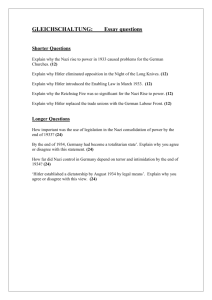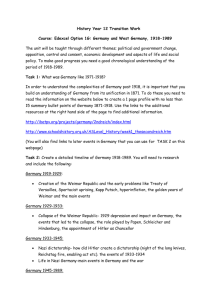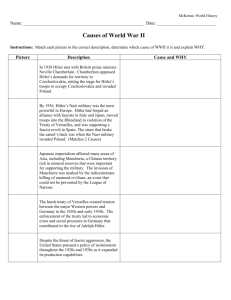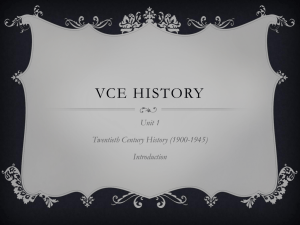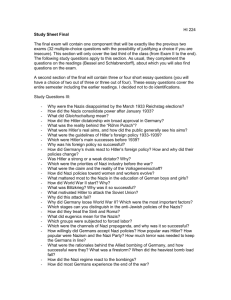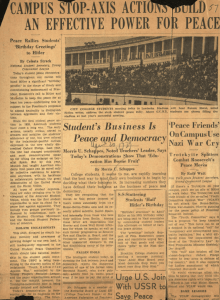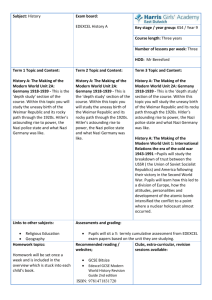The Rise of Hitler - SchoolsHistory.org.uk
advertisement
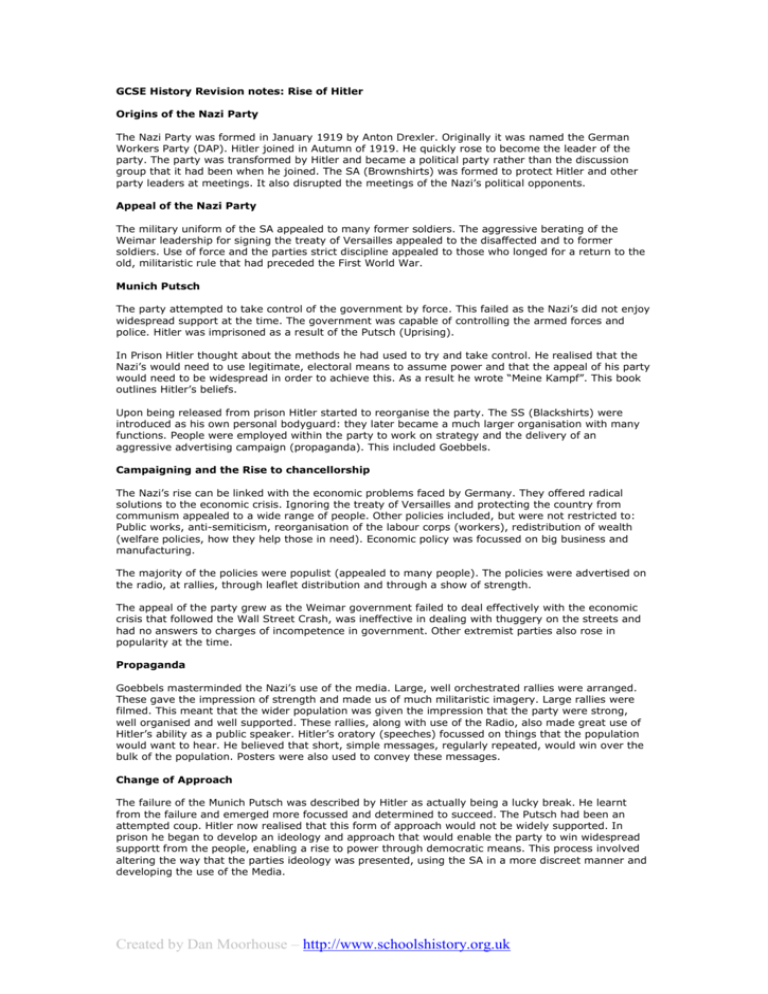
GCSE History Revision notes: Rise of Hitler Origins of the Nazi Party The Nazi Party was formed in January 1919 by Anton Drexler. Originally it was named the German Workers Party (DAP). Hitler joined in Autumn of 1919. He quickly rose to become the leader of the party. The party was transformed by Hitler and became a political party rather than the discussion group that it had been when he joined. The SA (Brownshirts) was formed to protect Hitler and other party leaders at meetings. It also disrupted the meetings of the Nazi’s political opponents. Appeal of the Nazi Party The military uniform of the SA appealed to many former soldiers. The aggressive berating of the Weimar leadership for signing the treaty of Versailles appealed to the disaffected and to former soldiers. Use of force and the parties strict discipline appealed to those who longed for a return to the old, militaristic rule that had preceded the First World War. Munich Putsch The party attempted to take control of the government by force. This failed as the Nazi’s did not enjoy widespread support at the time. The government was capable of controlling the armed forces and police. Hitler was imprisoned as a result of the Putsch (Uprising). In Prison Hitler thought about the methods he had used to try and take control. He realised that the Nazi’s would need to use legitimate, electoral means to assume power and that the appeal of his party would need to be widespread in order to achieve this. As a result he wrote “Meine Kampf”. This book outlines Hitler’s beliefs. Upon being released from prison Hitler started to reorganise the party. The SS (Blackshirts) were introduced as his own personal bodyguard: they later became a much larger organisation with many functions. People were employed within the party to work on strategy and the delivery of an aggressive advertising campaign (propaganda). This included Goebbels. Campaigning and the Rise to chancellorship The Nazi’s rise can be linked with the economic problems faced by Germany. They offered radical solutions to the economic crisis. Ignoring the treaty of Versailles and protecting the country from communism appealed to a wide range of people. Other policies included, but were not restricted to: Public works, anti-semiticism, reorganisation of the labour corps (workers), redistribution of wealth (welfare policies, how they help those in need). Economic policy was focussed on big business and manufacturing. The majority of the policies were populist (appealed to many people). The policies were advertised on the radio, at rallies, through leaflet distribution and through a show of strength. The appeal of the party grew as the Weimar government failed to deal effectively with the economic crisis that followed the Wall Street Crash, was ineffective in dealing with thuggery on the streets and had no answers to charges of incompetence in government. Other extremist parties also rose in popularity at the time. Propaganda Goebbels masterminded the Nazi’s use of the media. Large, well orchestrated rallies were arranged. These gave the impression of strength and made us of much militaristic imagery. Large rallies were filmed. This meant that the wider population was given the impression that the party were strong, well organised and well supported. These rallies, along with use of the Radio, also made great use of Hitler’s ability as a public speaker. Hitler’s oratory (speeches) focussed on things that the population would want to hear. He believed that short, simple messages, regularly repeated, would win over the bulk of the population. Posters were also used to convey these messages. Change of Approach The failure of the Munich Putsch was described by Hitler as actually being a lucky break. He learnt from the failure and emerged more focussed and determined to succeed. The Putsch had been an attempted coup. Hitler now realised that this form of approach would not be widely supported. In prison he began to develop an ideology and approach that would enable the party to win widespread supportt from the people, enabling a rise to power through democratic means. This process involved altering the way that the parties ideology was presented, using the SA in a more discreet manner and developing the use of the Media. Created by Dan Moorhouse – http://www.schoolshistory.org.uk Why 1933? The Wall Street Crash brought Germany’s economic improvement to a rapid end. The aid from America stopped. Industry struggled to cope under the new economic pressures and many were forced into liquidation. This resulted in many job losses, a lack of faith in investment opportunities and a devaluing of the German Currency. The Weimar Government was a coalition government. The parties within it failed to agree on several key areas and were therefore unable to make the changes to the economy that were necessary to halt the economic downturn. This situation allowed extremist groups, such as the Nazi’s and Communists, to exploit the situation. They offered solutions that had not been tried, the Nazi’s also appeared to be strong. Both of these were things that were liked by large sections of the population. The growth of the communist party at this time (a direct result of the Wall Street Crash) led to an increased fear of a communist takeover. Hitler’s party were able to use their extreme opposition to communism to gain support from industrialists, and gained votes from many whop feared a communist state. The continued economic crisis into the early 1930’s led to a loss of faith within some of the other political parties. These groups were less willing to work together than they had been previously and weak coalitions failed to inspire confidence in democracy .Imagery and bold promises led to increased support and belief in Hitler and his party. None of these factors were in place before 1929’s Economic Crash. Overview and Key points: Democracy was seen to be failing in Germany. Hitler offered a radical solution. Force was used to overcome opponents. Effective use of Propaganda. Manipulation of the system and bribery were commonplace. Sectoral appeal was broad. The Nazi’s NEVER gained an electoral majority in an open election. Hitler was invited to become chancellor of Germany by politicians from other parties who believed that they could control him. Few people realised the lengths to which the nazi’s would take their anti-semiticism. Created by Dan Moorhouse – http://www.schoolshistory.org.uk
